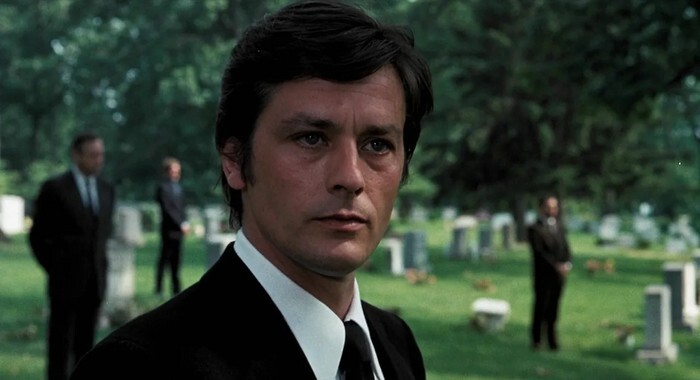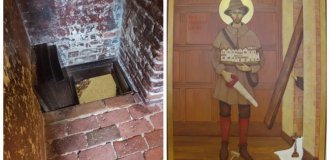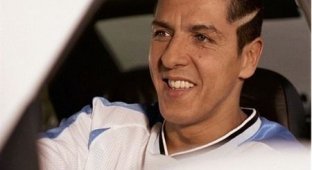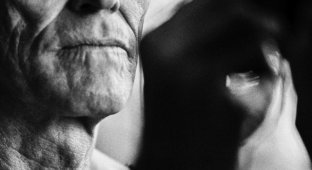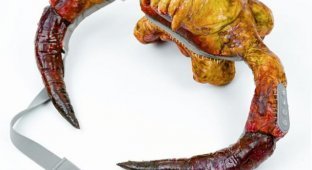Alain Delon – beautiful on the outside, terrible on the inside (25 photos)
French actor Alain Delon is the standard of male beauty. And it’s not just about his model appearance, but also about the type of masculinity that he embodied on the screen. Delon played different people, but his classic hero is firm, collected and cold-blooded. Without suffering from excessive modesty, this actor considers himself an example of a real man both in cinema and in life. 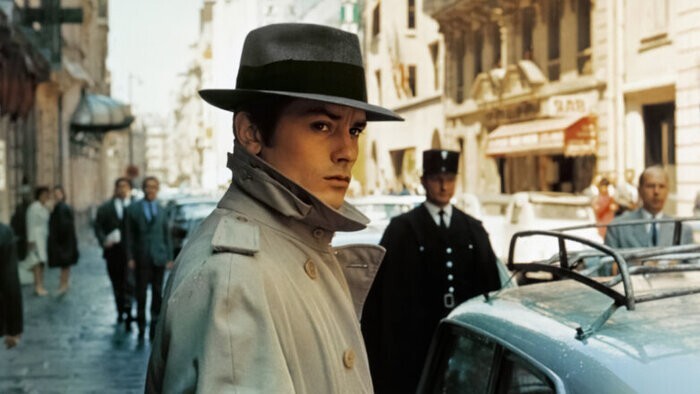
Meat
Delon considers himself to be among the generation of “titans who were devoured by dwarfs.” By dwarfs we mean the figures of modern cinema who have turned this art into a worthless bazaar. Partly, he explains, this is due to modern actors. Delon compares them to delicate indoor plants that do not know true life. Whereas many heroes of old cinema - Jean Gabin, Lino Ventura, and himself - came to cinema from the street. They knew what war, poverty, and hard work meant, which is why they looked so convincing on screen.
Young Alain had every chance of becoming a good butcher. His stepfather ran a sausage shop in Bourg-la-Rene, a town near Paris, and Delon was quite ready to continue the family business. He later joked that no one among the actors could cut ham better than him. His career as a butcher was hindered by his restless disposition: the young man could not sit still. 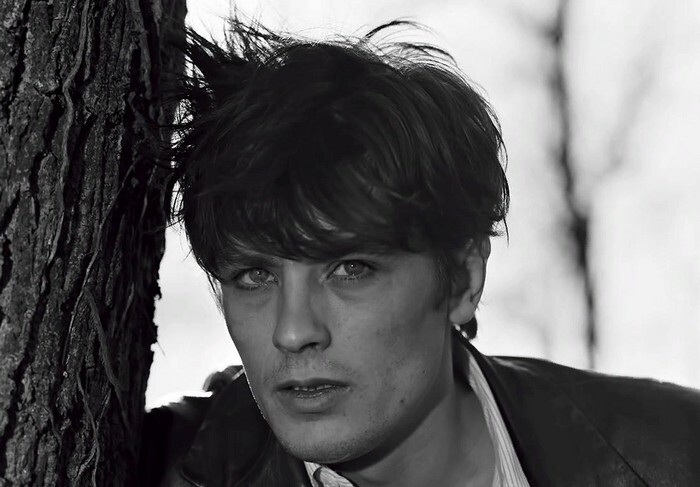
Relationships with parents were difficult. Alain was offended by his father for many years, believing that he abandoned him and his mother. But he did not feel warm feelings for his mother either, reproaching her for indifference. When she wrote her memoirs, the actor was very annoyed, claiming that she was lying and whitewashing herself.
All this determined Delon’s famous coldness and closedness. The world was not a friendly place for young Alain. Nero's kind family, into which he was sent to live for several years, could no longer change the character of a difficult teenager. 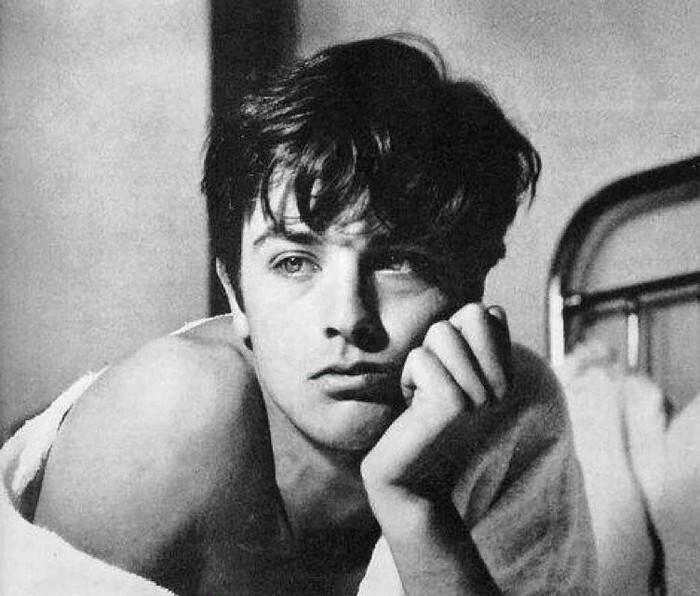
Marine in the guardhouse
At the age of 17, even before conscription age, having deceived the military commission, Delon joined the Marine Corps. His parents were in a hurry to place the unruly young man in a safe place, and he himself was in a hurry to look for adventure. He liked it in the army. “I was happy there. I learned what brotherhood is. I could become a career military man. “I had the makings of a great soldier,” Delon later said.
But it didn’t work out. After training, Alain went to war in Indochina, where this great soldier became famous for his special kind of exploits: he would fight with someone, get drunk, steal equipment, or steal and smash a government-issued jeep to pieces. Delon spent more time in the guardhouse than in the barracks, and celebrated his twentieth birthday in the punishment cell. As a result, he was simply fired and sent to France. 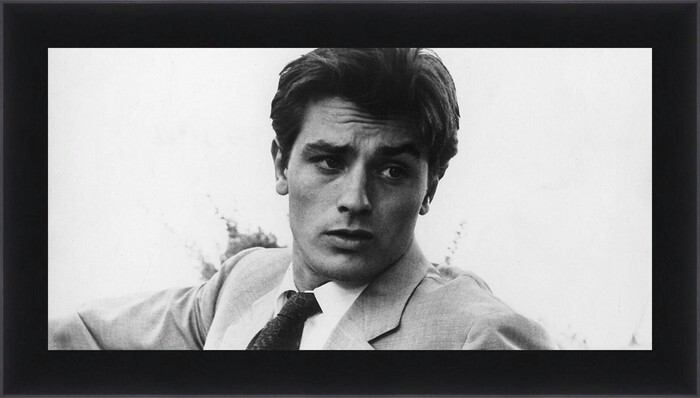
In no particular hurry to return to the sausage shop, Delon settled in the port of Marseille, where he made acquaintances with local bandits. When he later got the roles of gangsters, it was easy for Alain to play, because he knew this environment well.
Young Delon noticed that his appearance made an impression. But he never even thought about using it in a movie. Therefore, when one day a strange American approached him on the street, introducing himself as Harry Wilson, and offered to go to a screen test in Rome, Alain did not know what to think. It was 1956, and Hollywood director Charles Vidor, along with producer David Sleznick, was adapting Hemingway's novel A Farewell to Arms. 21-year-old Delon was seduced by the idea of going to Rome. The tests turned out to be successful, Sleznik offered the young man a contract, but he did not believe the happiness that unexpectedly befell him and asked for time to think. 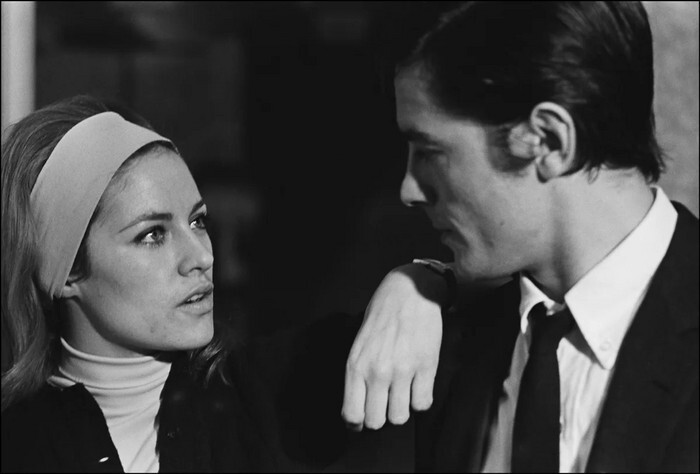
Be beautiful and don't be silent
He thought while living in Paris in a cheap hotel on Place Pigalle, in the famous quarter of prostitutes. Local girls fell in love with the handsome young man. Delon worked as a loader at the Central Market, “the Belly of Paris,” as it came to be called thanks to Zola. This seemed more acceptable to the butcher's son than acting in films.
Delon's social circle included not only prostitutes: among his new acquaintances were the young actor Jean-Claude Brialy and the actress Brigitte Aubert. He told his friends about his Roman auditions and asked about the world of cinema: is it worth getting involved with? 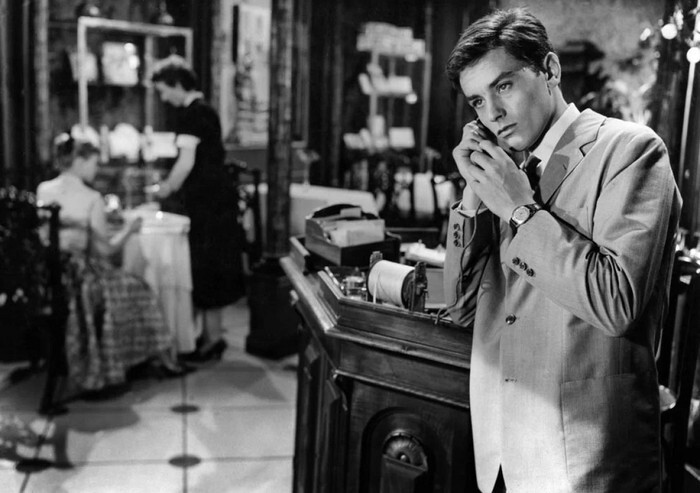
Once, at the age of 14, he acted in an amateur film, and he did not like the experience. But Brialy advised Delon to try again and brought him to the venerable actor Bernard Blier (whose son, Bertrand, later directed “Waltzers,” “Cold Appetizers” and many other films). Blier was filming Yves Allegre's When a Woman Interferes (1957) and convinced the director to cast Delon in the small role of the hitman Joe. Remembering his Marseille friends, Delon played very convincingly.
Allegre, in turn, recommended Alain to his older brother Mark, also a director. This is how Delon got into his second film, “Be Beautiful and Be Quiet” (1958), on the set of which he met another young actor, Jean-Paul Belmondo. So different both in appearance and in character, they became friends-competitors for life. But mostly friends. 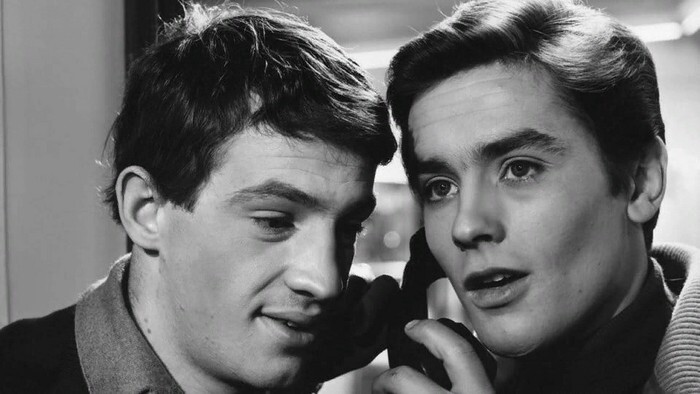
Olga Horstig, the impresario of many famous actors, began to take care of Delon’s affairs. Alain called her his godmother in the movies. Delon simply explained his rapid adaptation to a profession that had recently been completely alien to him: “There are three types of actors: bad, good and great. Everything is clear with the bad ones, they play incompetently, the good ones play well. But the greats don’t play anything. They just live in front of the camera. Like Jean Gabin, like Brando. Like me".
Big roles
On the set of the third film, the costume drama “Christine” (1958), another important acquaintance occurred: German actress Romy Schneider became Delon’s partner. Their love began with hostility: Schneider was critical of Delon, noting that he was “too handsome, too well-groomed.” But they soon became a couple, to the horror of Romy’s aristocratic parents, who considered Alain a rootless dog. 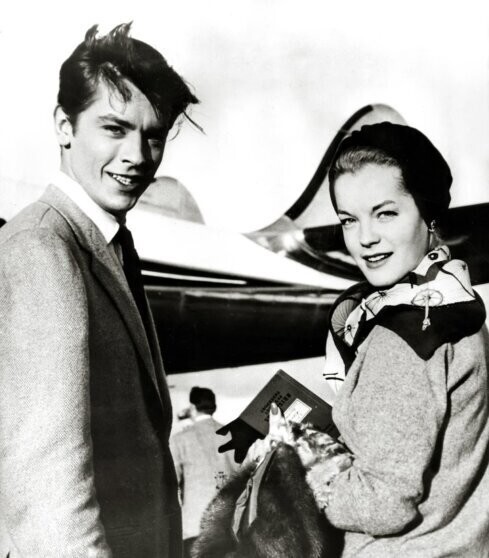
Alain Delon and Romy Schneider
In 1961, they played together in the play “It’s a Pity She’s a Whore,” staged by Luchino Visconti. But in general, Delon and Schneider, two sought-after actors, rarely saw each other, being on set all the time. This undermined their relationship, which Delon once decided to harshly break off: returning home from another filming, Romy found forty black roses on the table and a note in which Alain wrote that he was giving her freedom, but keeping her heart for himself. The last phrase was tragically accurate: Schneider did not recover from this ruthless breakup until the end of her life.
In 1960, 25-year-old Delon received two roles that made him a real great actor: Tom Ripley, consumed by envy and a sense of class hatred, killing a rich friend in the film “In the Bright Sun” by René Clement, and the young boxer Rocco Parondi in Luchino Visconti’s drama “Rocco” and his brothers." It was a pass to the classics, to big cinema. 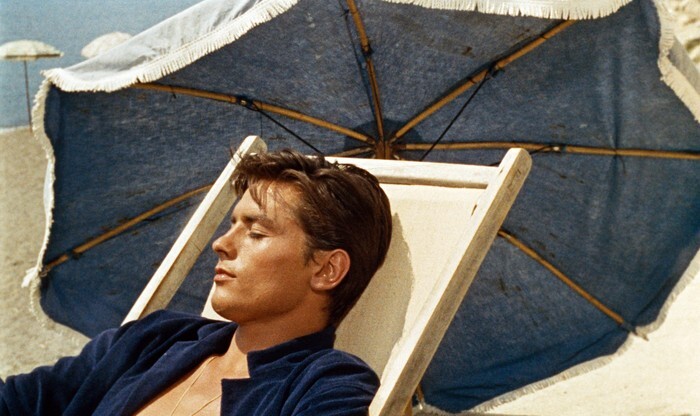
Visconti became Delon's teacher, although rumors, supported by Schneider's parents, spoke of a more informal relationship: the Italian master was gay. Commenting on this, Delon said: “Lukino is an esthete, he loved beauty, giving preference to male beauty. He wasn’t in love with me, but he was infatuated, that’s true.”
French thriller with Alain Delon “In the Bright Sun” (1960) Plein soleil based on the novel by Patricia Highsmith. Directed by René Clément
Two years later, Visconti would direct Delon in another of his films, “The Leopard” (1962). The director and actor hatched the idea of adapting the series of novels “In Search of Lost Time” by Marcel Proust, but these projects were not realized. When Alain played Baron de Charlus in Volker Schlöndorff's Swann's Love in 1983, a Proustian production finally realized, he spoke of the work as a debt to the late Visconti.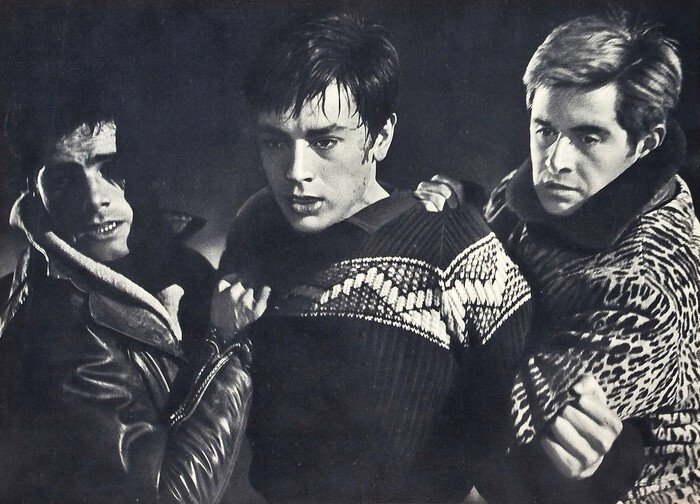
Best time
In 1963, Delon was awarded a personal retrospective at the Paris Cinematheque. He had something to show: in addition to the already mentioned films, such major works as “Eclipse” by Michelangelo Antonioni, “The Devil and the Ten Commandments” by Julien Duvivier and “Melodies from the Cellar” by Henri Verneuil were added to his filmography. In the last film he played for the first time with Jean Gabin, who became his close friend. Together they also starred in the films “The Sicilian Clan” (1969) and “Two for the Town” (1973).
Delon was annoyed that many saw him only as a handsome man. In the early years, he had to prove that he was not just the owner of a pretty appearance, but also an extraordinary actor. But it was more necessary to prove this to the audience and critics, since all the directors who worked with him recognized Alain’s special gift for subjugating the space of the frame and attracting attention. 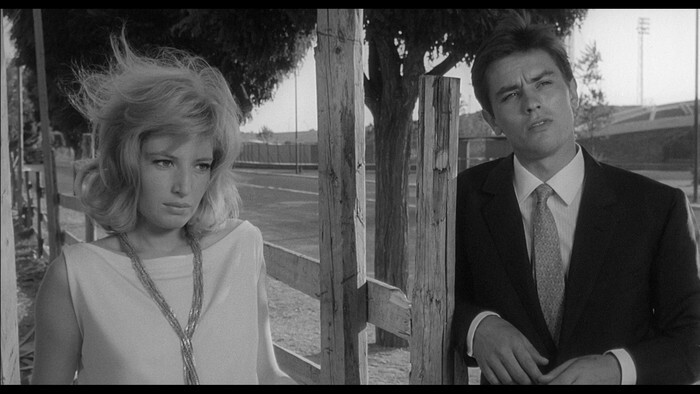
Changing roles and experimenting, Delon, nevertheless, created a certain recognizable male type of a collected, serious, taciturn man. He clearly followed the path of his older comrades and idols: Jean Gabin, Lino Ventura, Burt Lancaster, Humphrey Bogart. They preferred not to surprise viewers with wonderful transformations, but to give them, with some variations, a specific and well-recognized film image.
Although he was already a star, Delon was hurt by the lack of attention from the directors of the fashionable new wave at that time: Godard, Malle, Chabrol, Truffaut. They eagerly photographed his friend Belmondo, but were indifferent to Alain. 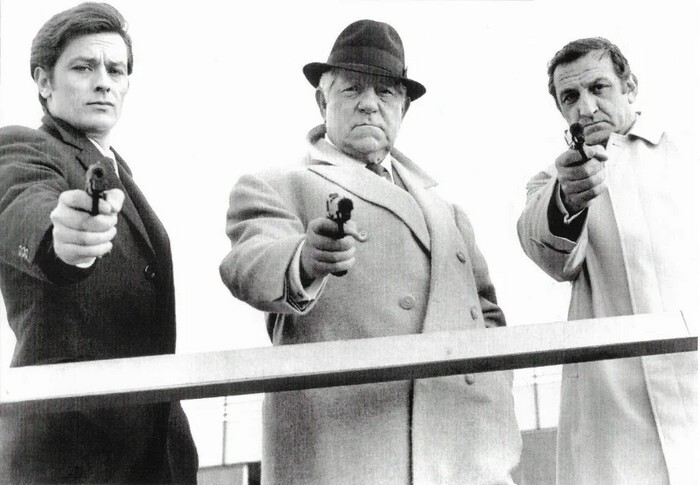
Having achieved recognition in his homeland, in the mid-1960s Delon went to Hollywood, where he starred in five films, but returned before the end of the contract: there was no great American success.
In France, an incredibly fruitful period awaited him: within a few years, Delon showed himself in a mass of dizzyingly magnificent films, perhaps the best of his life: “The Adventurers” (1967) with Lino Ventura, “Samurai” (1967) by Jean-Pierre Melville , “Farewell, Friend” (1968) with Charles Bronson, who was then in his “French period”, “Swimming Pool” (1968) with Maurice Ronet, Romy Schneider and Jane Birkin, “Borsalino” (1969) with Belmondo, “Red Sun” "(1971) with Bronson and Toshiro Mifune. 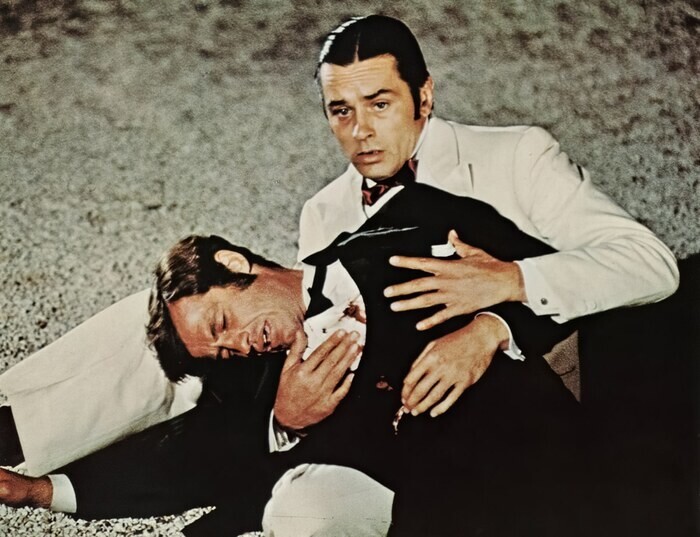
The “samurai” killer Zhef became a key role for the actor: firm, reserved, mysterious, uttering words only in case of emergency - Delon believed that this image was as close as possible to himself.
Man and chest of drawers
Melville, the luminary of French neo-noir, also directed Delon in The Red Circle (1970) and The Policeman (1972). Alain perfectly matched the atmosphere of his films - cold, distant, extremely taciturn. 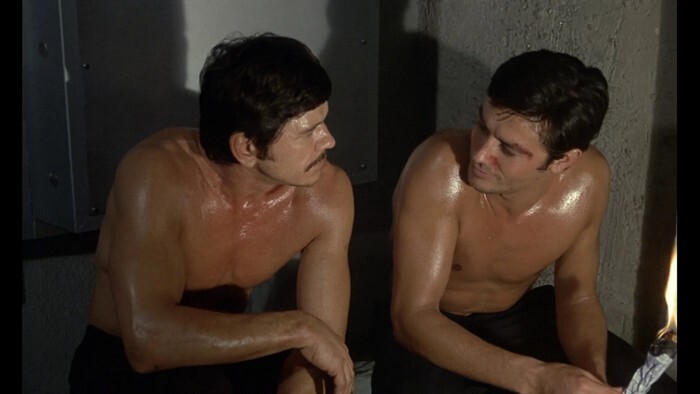
The audience had approximately the same idea about Delon himself: that he was stingy with feelings, withdrawn and self-satisfied. This idea was confirmed by some of his film partners. Brigitte Bardot wrote in her memoirs: “Communicating with Alain is the same as communicating with a chest of drawers! This face, these eyes do not express anything, they do not excite, do not attract, there is not a hint of truth, of feeling, of passion in them. Alain is a cold creature, he is an extreme egoist; to keep warm, he couldn’t think of anything better than to star in an advertisement for fur products.”
Gaben's daughter Florence, with whom Delon had a close relationship, paints a completely different portrait in her memoirs. She speaks of him as a caring, attentive and gentle person. 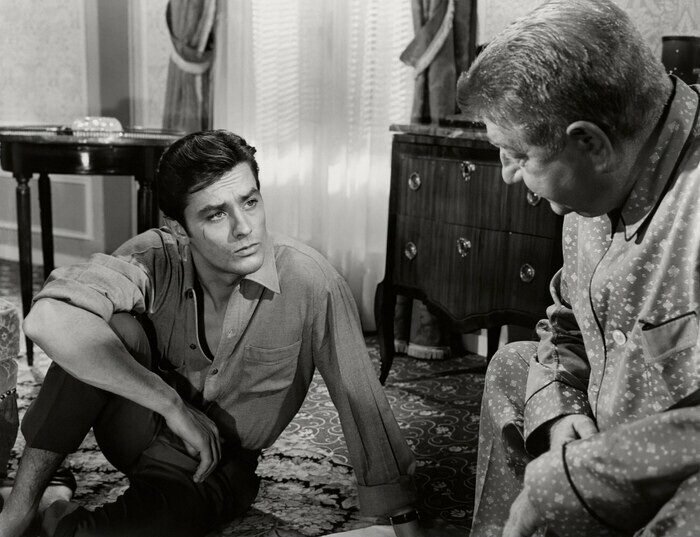
A completely unexpected characterization of Delon surfaced when a very difficult scandal for the actor broke out: in 1968, not far from Alain’s mansion, the corpse of his comrade and bodyguard, Serbian Stevan Markovic, was discovered. The press began to write about Delon's contacts with the mafia. A letter from the deceased to his brother in Yugoslavia, sent shortly before his death, was also found. In it, Delon is portrayed as "a weak-hearted and sick man, whose opinion constantly changes depending on circumstances and who submits to anyone who has a stronger character than his."
Another gangster and friend of Delon, the “lame Corsican” Francois Marcantoni, a suspect in the Markovich case, in his testimony described the movie star as a “very kind” and “easily influenced” person. 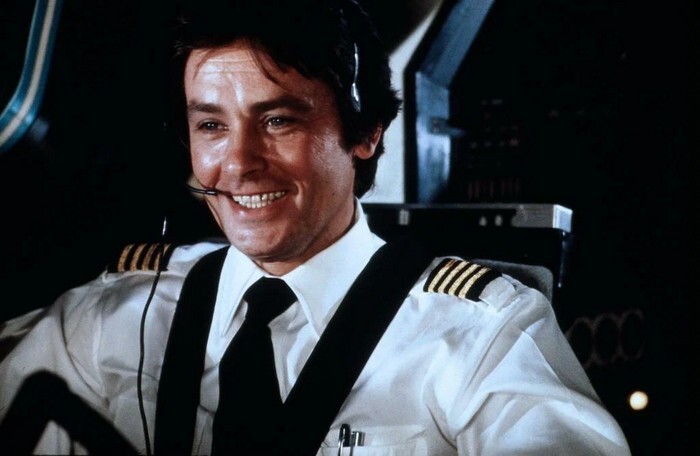
Perhaps the actor seemed stern and unapproachable to ordinary people. And by the harsh standards of the criminal world, where man is a wolf to man, he was too trusting and soft.
Unbowed and unsociable
The investigation into Markovich's murder lasted several years, and the noise around it greatly frayed Delon's nerves. In 1970, he even wrote an open letter to President Pompidou asking him to protect his family from possible provocations and slander. 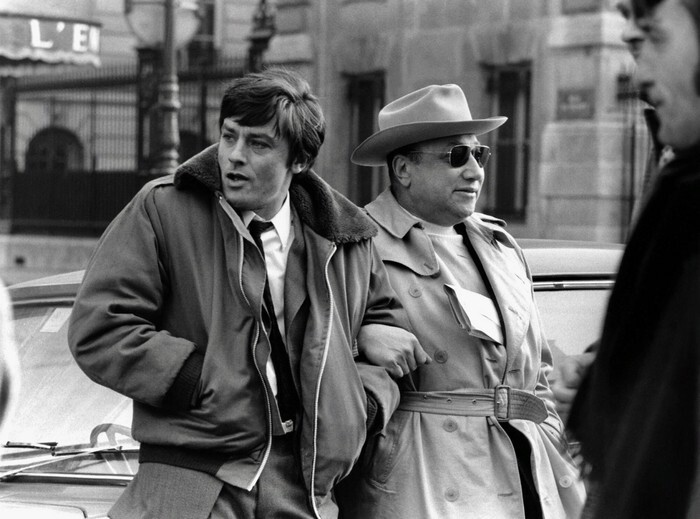
As for the character of the “icy handsome man,” a rather detailed and exalted description of him was left by the actor’s old friend Jean Ko, a writer and scriptwriter for such films as “Invictus,” “Borsalino” and “Jeff.” “I don’t know a more secretive and reserved person than him,” Ko wrote. “I don’t know a more unsociable and lonely person.” In a momentary impulse, he is able to give away what is most precious and show tenderness. But it will look like he’s only defending himself.”
According to Ko, Delon is so nervous in life (“resembles a wild animal that they want to catch, and therefore he always has to hide from his pursuers”) that when he finally manages to relax a little, he instantly falls asleep from exhaustion. This seems to be the price of icy calm. 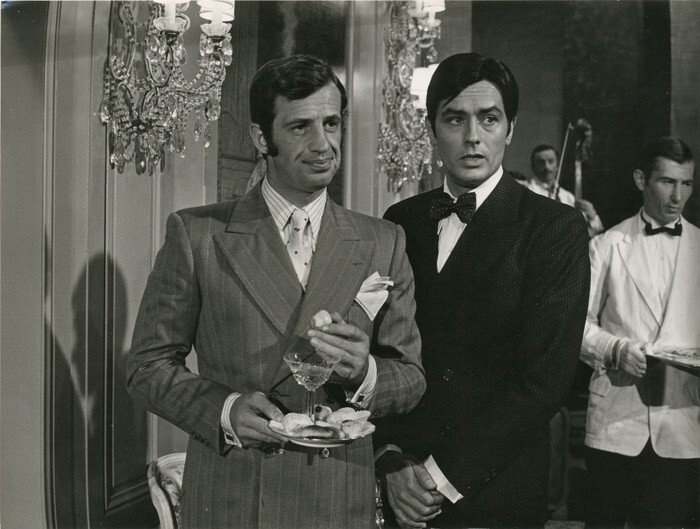
However, in public life Delon was not distinguished by restraint. Possessor of an ideal appearance, he was not an example of sophistication and tact in dealing with people. Behind his back he was called uncouth. He could easily lose his temper during an interview, and he never spared unkind words for film critics. When another scandal was brewing, Delon sat down and wrote an open letter to some newspaper. The actor did not even think of hiding his shortcomings: “I am a Scorpio, an addicted person, I have a nasty and rather quarrelsome character. This is where many of my troubles in life come from.”
You can't run away from the police
The heroes of Delon's most successful films were police officers and thieves. Wanting to get out of this monotony, the actor experimented a lot in the 1970s: successful from an artistic point of view, but not always successful from a financial point of view. In the film “First Night of Rest” (1972), he played a battered schoolteacher in love with a vicious nymphet. In “The Assassination of Trotsky” of the same year - Ramon Mercader, the murderer of the Bolshevik. In Monsieur Klein (1975), he is an indifferent World War II businessman who regains his sight after being mistakenly sent to execution along with the Jews. In "Man in a Hurry" (1977) almost himself (as he himself admitted) - a collector who wasted his life in pursuit of valuable objects. But all these interesting paintings did not have the success that Delon had hoped for, and this hurt him. 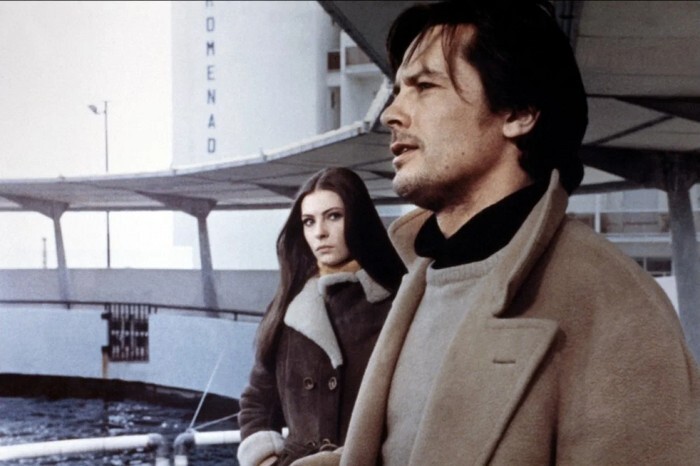
He continued to regularly produce paintings with the word “policeman” in the title: “Police Story”, “For the Skin of a Policeman”, “The Word of a Policeman”, “Don’t Wake a Sleeping Policeman”. On the one hand, the characters in these films are not always similar to each other, on the other hand, they look like parts of one endless story.
The French police should erect a monument to Delon, given how many law enforcement officers he portrayed in the movies. And in the 1979 Soviet film “Tehran-43” he also played an inspector. 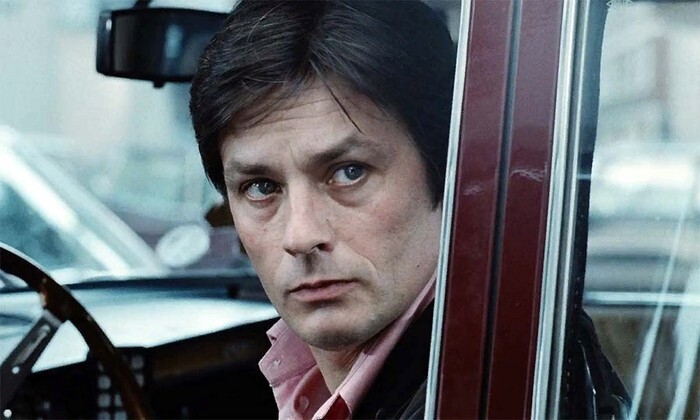
Since the mid-1960s, Delon has produced most of his films. By the early 1980s, he matured into directing and made two films: the well-received “Behind the Cop” by critics and audiences and the much more lukewarm “Untamed” (1983). He did not continue, perhaps having satisfied his ambitions.
Everything starts to go bad
In the eighties, Delon’s relationship with film criticism (which traditionally has great power in France), which had previously been tense, deteriorated completely. This happened after he played the main role in Bertrand Blier's Our History in 1984. Blier made a film quite typical of himself - difficult to perceive and not promising financial profit, but for some reason Delon very much counted on its success. And when critics tore the picture to pieces, Delon did not reach for a word. A squabble began, during which the star was reminded of many things, including sympathy for Le Pen, the leader of the French ultra-right. In response, Delon said that he always hated communists (which was a clear exaggeration, since he enjoyed working with left-wing directors: Visconti, Losey, Godard). But many did not like these statements made in the heat of the moment, since left-wing sentiments are very widespread in France. Having cut short the controversy, the actor defiantly moved to live in Switzerland. 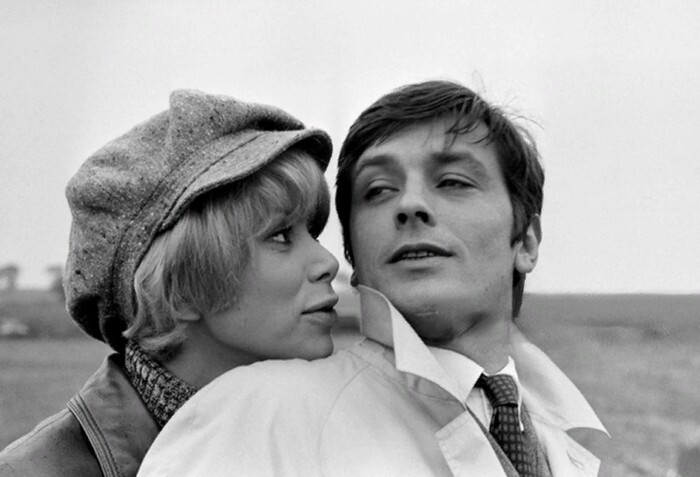
In 1990, history repeated itself when Delon finally had the opportunity to “close the gestalt” - to star in the classic of the new wave Jean-Luc Godard. But critics also criticized this film with the remarkable title “New Wave.” The actor’s other later works met with a similar reaction: “Dancing Machine” (1990), “The Return of Casanova” (1991), “Day and Night” (1996).
Even the commercial blockbuster, a duet with Belmondo’s old friend “One Chance for Two” (1998), did not give the effect that the creators expected. Delon decided that there were no more normal films for him. 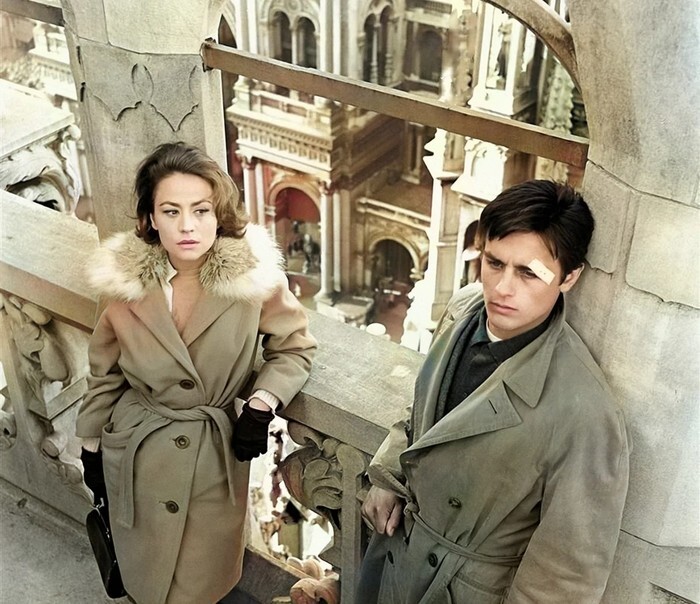
The last picture with his participation was released in 2008, and it was “Asterix at the Olympic Games.” The film, of course, turned out to be fun, but it did not add anything to the status of the actor who worked with Visconti, Clément and Melville.
Acting in the theater (“Mysterious Variations”, 1996, “Road to Madison”, 2007, “Love Letters”, 2008) could not replace the aging star’s film career, and Delon chose to leave acting altogether, choosing the life of a recluse in a Swiss villa surrounded by his beloved dogs . And no women. 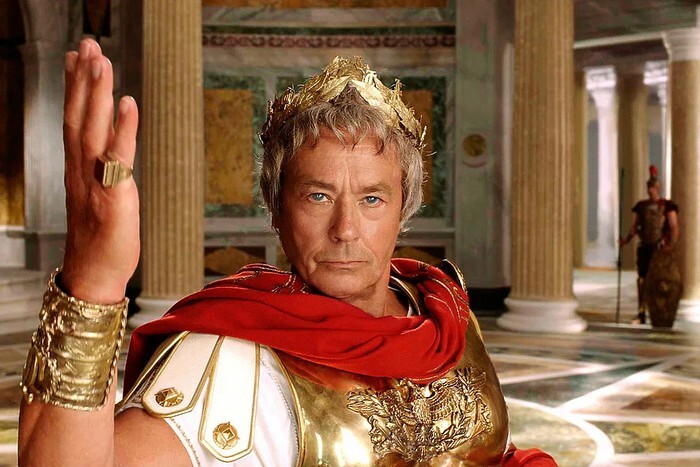
Severe style
The actor seems to be mortally tired of female attention. The last marriage, with Dutch model Rosalie van Bremen, 36 years younger than Delon, ended in 2002. He gave Delon two children - daughter Anushka and son Alain-Fabien. They received a lot of attention from their father, which cannot be said about the previous two: Anthony from Nathalie Delon and Ari from the German singer and actress Nico (the same one who worked with Andy Warhol and sang on the first album of The Velvet Underground). The actor did not admit the latter at all. Moreover, he was angry with his mother for taking her grandson into her care.
Lone wolf, he is still not as heartless as he may seem. When Mireille Darc, abandoned by him after 15 years of marriage, got into a car accident, he immediately rushed to the hospital and kept watch at her bedside for several weeks. After making sure that she had recovered, Delon disappeared completely. 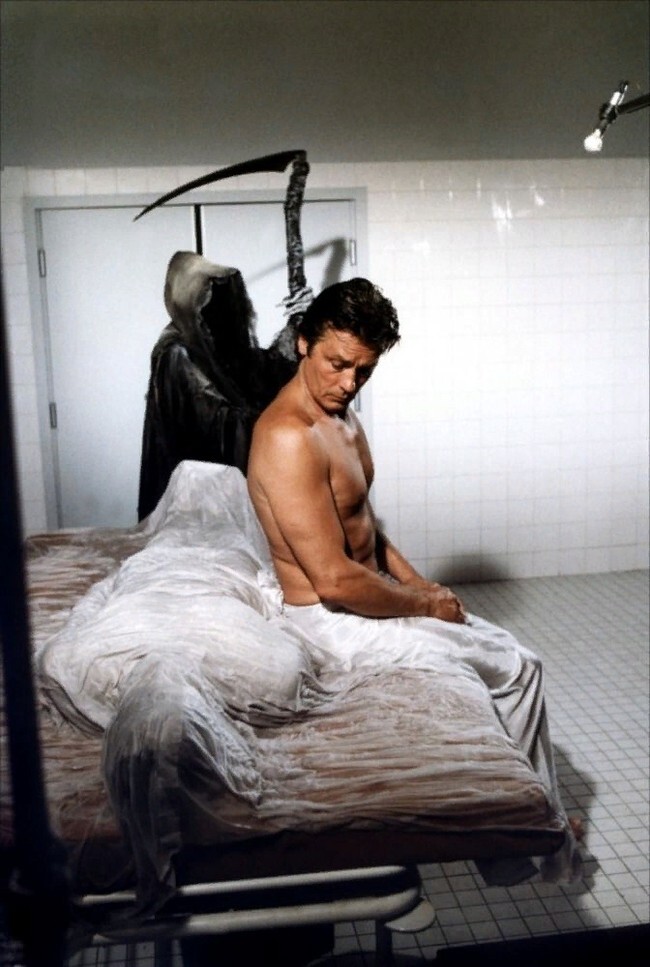
Delon's life principle is simple: a man must be a man. Raising courage in his son Anthony, he pushed him into an enclosure with evil dogs, trained to tear to pieces anyone except the owner. He himself was watching from behind bars with a gun. It is not surprising that relations in this family did not work out.
In his youth, Delon called himself a fan of de Gaulle, and in the 1980s he began to support Le Pen. For this he was deprived of his honorary lifelong seat on the jury of the Miss France competition. No big loss: Delon always preferred male company. 